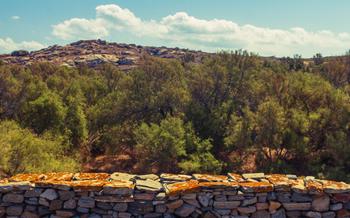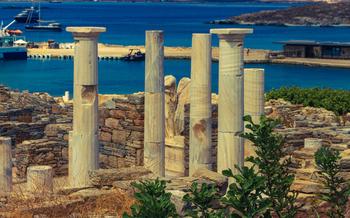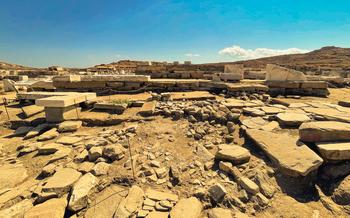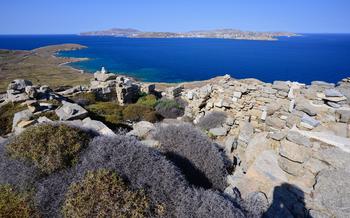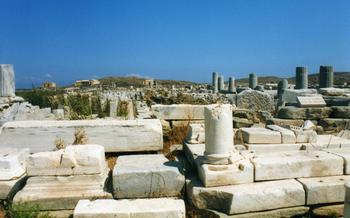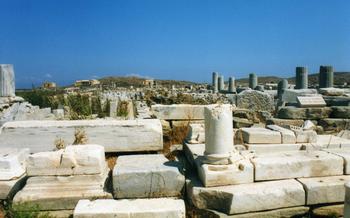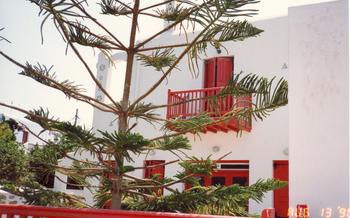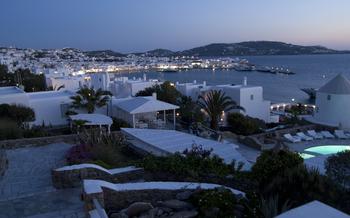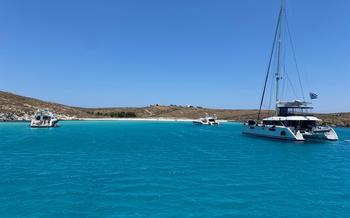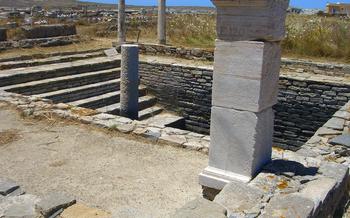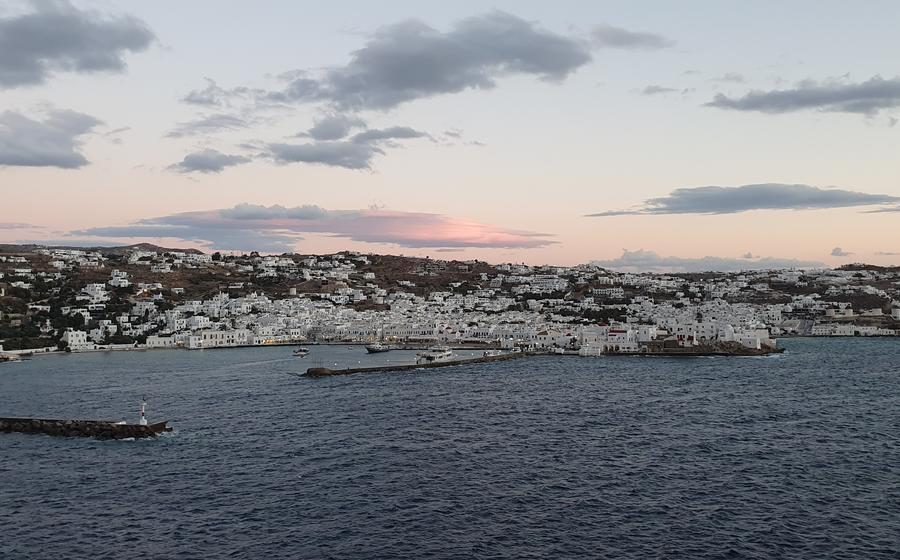
Stadium of Delos
- Historical Significance
- Location and Getting There
- Admission and Fees
- Layout and Architecture
- Imagine the Ambiance
- Visit the Museum
- Explore the Archaeological Site
- Enjoy the Views
- Combine with Other Attractions
- Wear Comfortable Shoes
- Stay Hydrated
- Respect the Site
- Photography Tips
- Guided Tours
- Insider Tip: Experience the Magic of Delos at Sunset
Historical Significance
Journey back in time to the ancient city of Delos, where the Stadium of Delos stands as a testament to the rich history of the Delos Games. Constructed in the 3rd century BC, this impressive stadium played a pivotal role in the religious and cultural life of ancient Greece.
During the Delos Games, athletes from across the Hellenic world competed in a variety of sports, including footraces, wrestling, boxing, and chariot races. These games were held every four years in honor of Apollo, the patron deity of Delos, and attracted thousands of spectators.
The stadium's unique design reflects the importance of the Delos Games. With a capacity of over 6,000 spectators, it features a U-shaped layout with tiered seating carved into the hillside. The starting line, marked by a row of stone blocks, is still visible today, evoking the excitement and anticipation of the ancient athletes as they prepared to race.
After centuries of abandonment, the Stadium of Delos was rediscovered in the 19th century by French archaeologists. Today, it stands as a symbol of ancient Greek athleticism and the enduring legacy of the Delos Games.
Location and Getting There
To reach the Stadium of Delos from Mykonos, you can take a ferry or a boat tour from the island's main port. Ferries depart regularly throughout the day, with a journey time of approximately 30 minutes. The frequency of ferry services increases during the summer months to accommodate the influx of tourists.
Boat tours offer a more leisurely and scenic way to get to Delos. These tours typically include stops at other nearby islands, such as Rhenia, and provide guided commentary on the history and mythology of the region. The duration of boat tours varies, but most last for around half a day or a full day.
Once you arrive at Delos, follow the signs to the Stadium of Delos. The stadium is located a short walk from the port, and the path is well-marked. You can also join a guided tour of the island, which will include a visit to the stadium.
If you're planning a day trip to Delos, it's advisable to start early to make the most of your time. Remember to bring comfortable shoes, water, and sunscreen, as the site involves a fair amount of walking and exposure to the sun.
Admission and Fees
Visiting the Stadium of Delos does not require a separate admission fee. If you have purchased a general admission ticket for the entire archaeological site of Delos, it includes access to the stadium and all other attractions within the site. The standard ticket price is €12 for adults, €6 for students and seniors, and free for children under 1
Alternatively, visitors can opt for a combined ticket, which includes admission to the Delos Archaeological Museum and the Stadium of Delos. This combined ticket costs €15 for adults and €50 for students and seniors.
Guided tours of the stadium are available for an additional fee. Prices vary depending on the tour operator and the size of the group. Guided tours typically provide in-depth insights into the stadium's history, architecture, and significance, enhancing the overall visitor experience.
Layout and Architecture
The Stadium of Delos boasts a remarkable layout and design that reflects the ingenuity of ancient Greek architects. Its elliptical shape, typical of Greek stadiums, encompasses a central track measuring approximately 185 meters in length. The track is flanked by tiers of seating, rising in concentric rows, capable of accommodating thousands of spectators. The starting line, marked by a series of parallel stone blocks, is positioned at one end of the track, ensuring a fair and equal start for athletes.
The stadium's construction showcases the exceptional craftsmanship of the ancient Greeks. Built primarily from local marble, the stadium features arched gateways that serve as entrances and exits. These gateways add to the stadium's grandeur and provide convenient access for spectators. The seating tiers, meticulously carved from stone, demonstrate the attention to detail and precision that characterized ancient Greek architecture.
Comparing the Stadium of Delos to other ancient Greek stadiums reveals both similarities and distinctions. While the overall layout and design follow the typical Greek model, the Delos stadium is unique in its setting. Situated on the sacred island of Delos, surrounded by the sparkling Aegean Sea, the stadium offers a breathtaking backdrop for athletic competitions. Additionally, its proximity to other significant structures, such as the Temple of Apollo and the Agora, highlights the stadium's integration within the broader religious and civic life of ancient Delos.
Imagine the Ambiance
Imagine yourself transported back in time to the ancient city of Delos, a bustling hub of religious and cultural significance in the heart of the Aegean Sea. The air is filled with the scent of incense and the sounds of chanting priests as you approach the Stadium of Delos, a magnificent structure that once hosted the renowned Delos Games.
Step through the arched gateways and enter the stadium, where a sea of faces greets you. The tiered seating rises steeply around the track, providing spectators with an unobstructed view of the competitions about to unfold. The athletes, clad in simple tunics, warm up on the dusty track, their bodies glistening with sweat and determination.
As the sun beats down upon the stadium, the crowd erupts into a roar as the games commence. The runners take their positions at the starting line, their muscles tensed and their eyes fixed on the finish line. The sound of a gong pierces the air, and they burst forth in a sprint, their feet pounding against the hard-packed earth.
The crowd cheers and jeers, their emotions palpable as the athletes push themselves to the limit. The air is thick with anticipation, and the stadium becomes a vortex of energy and excitement. Winners are crowned with laurel wreaths and showered with adulation, while losers accept their defeat with grace and sportsmanship.
Beyond the athletic competitions, the Delos Games were also a time for cultural exchange and celebration. Poets recited their verses, musicians played their instruments, and dancers performed graceful routines. The stadium transformed into a vibrant marketplace, where merchants from across the Mediterranean peddled their wares and visitors from far-off lands mingled and shared stories.
As the sun sets over the Aegean Sea, casting a golden glow upon the stadium, the Delos Games come to an end. The athletes, spectators, and performers depart, leaving behind the echoes of their cheers, laughter, and tears. The stadium stands silent once more, a testament to the enduring spirit of ancient Greece and the timeless power of sport.
Visit the Museum
Within the vicinity of the Stadium of Delos, an on-site museum awaits your curious footsteps. Step inside and embark on a journey through time as you encounter a treasure trove of artifacts and exhibits that illuminate the stadium's captivating history. These relics, carefully curated and displayed, offer a tangible connection to the athletes, spectators, and rituals that once filled this ancient arena with life.
Among the museum's highlights, marvel at inscriptions that immortalize the names of victors, evoking the triumphs and struggles of these ancient competitors. Admire intricate sculptures that once adorned the stadium, each piece whispering tales of athletic prowess and divine patronage. Furthermore, the museum houses a collection of pottery, coins, and other artifacts unearthed during excavations, providing glimpses into the daily lives and customs of Delos' inhabitants.
Through these captivating exhibits, the museum breathes life into the Stadium of Delos, transforming it from a mere structure into a vibrant stage where history unfolds. It invites you to become immersed in the spirit of the Delos Games, to feel the pulse of the crowd, and to witness the spectacle that unfolded within these hallowed grounds.
Explore the Archaeological Site
Venture beyond the stadium to explore the captivating archaeological site of Delos, a treasure trove of ancient ruins and historical wonders. Immerse yourself in the rich tapestry of this UNESCO World Heritage Site, where every stone whispers tales of a bygone era. Stroll along the sacred way, once tread upon by pilgrims seeking divine guidance at the Temple of Apollo. Marvel at the grandeur of the Agora, the bustling marketplace where merchants haggled and ideas exchanged. Step into the House of Dionysus, a lavish private residence adorned with intricate mosaics that depict scenes from Greek mythology. Let the whispers of history guide you as you uncover the secrets of this extraordinary island, where the past comes alive at every turn.
Enjoy the Views
The Stadium of Delos offers breathtaking panoramic views that extend far beyond the ancient ruins. From the upper tiers of the stadium, visitors can feast their eyes on the deep blue expanse of the Aegean Sea, dotted with neighboring islands that shimmer in the sunlight. The coastline of Delos itself, with its pristine beaches and rocky coves, provides a picturesque backdrop for the stadium. The best time to visit the stadium for optimal views is during the golden hour, when the setting sun casts a warm glow over the landscape, creating an unforgettable spectacle. Take a moment to relax on the stadium's stone benches and soak in the beauty of the surroundings. Let the tranquility of the ancient stadium and the stunning views transport you back in time, allowing you to imagine the grandeur of the Delos Games and the vibrant atmosphere that once filled this sacred space.
Combine with Other Attractions
Enrich your visit to the Stadium of Delos by exploring the neighboring attractions. Just a short walk away lies the Archaeological Museum of Delos, housing a treasure trove of artifacts unearthed from the ancient city. Admire exquisite sculptures, pottery, jewelry, and inscriptions that shed light on Delos's rich history and cultural heritage.
Venture further into Mykonos Town, a picturesque labyrinth of whitewashed buildings, charming boutiques, and inviting tavernas. Stroll along the narrow streets, soak in the vibrant atmosphere, and indulge in delicious Greek cuisine. Don't miss the iconic Mykonos Windmills, a symbol of the island's maritime past, offering panoramic views of the town and the Aegean Sea.
Customize your itinerary based on your interests. History buffs can delve deeper into Delos's past at the House of Dionysus, a well-preserved private residence showcasing stunning mosaics and frescoes. Nature enthusiasts can embark on a scenic hike along the Delos coastline, discovering hidden coves and enjoying breathtaking views of the surrounding islands.
Tailor your visit to create a memorable experience that combines ancient history, cultural immersion, and the captivating charm of Mykonos.
Wear Comfortable Shoes
When visiting the Stadium of Delos, comfortable walking shoes are an absolute must. The archaeological site involves a fair amount of walking on uneven surfaces, including ancient cobblestones and uneven paths. Wearing sandals or flip-flops is not recommended for safety reasons, as you may risk tripping or injuring your feet. It's important to have good support and traction to navigate the site safely and comfortably. Additionally, consider bringing along a hat and sunscreen to protect yourself from the Greek sun, especially during the hot summer months.
Stay Hydrated
When visiting the Stadium of Delos, it is crucial to stay hydrated, especially during the scorching Greek summer months. The sun's intensity can be overwhelming, leading to dehydration and heat-related issues. To avoid any discomfort, visitors should bring their own water bottles or purchase them from the on-site café.
Taking regular breaks in the shade or seeking refuge in the museum during the hottest hours of the day is highly recommended. Remember, staying hydrated is essential for a safe and enjoyable visit to this ancient wonder.
Respect the Site
As you explore the Stadium of Delos, it is crucial to remember that you are walking on a UNESCO World Heritage Site. This ancient site deserves to be treated with the utmost respect and care. Please stay on the designated paths and avoid touching or climbing on ancient structures. Refrain from littering and be mindful of your behavior, ensuring that you leave the site as you found it. By respecting the site, you are helping to preserve this incredible piece of history for future generations.
Photography Tips
Capture the essence of the Stadium of Delos through stunning photographs that will immortalize your visit. For breathtaking shots, position yourself at the center of the stadium and utilize a wide-angle lens to encompass the grandeur of the structure. Experiment with different angles to create dynamic compositions, ensuring the stadium's majestic presence dominates the frame. Consider the lighting conditions; the golden hues of sunrise or sunset cast a magical glow, while the stark contrast of midday sun accentuates the stadium's architectural details. Embrace the beauty of black-and-white photography to convey a timeless elegance, or let the vibrant colors of the stadium come alive in your images. Whether you're a seasoned photographer or simply seeking memorable keepsakes, the Stadium of Delos offers endless opportunities for capturing its timeless allure.
Guided Tours
Joining a guided tour of the Stadium of Delos is an excellent way to enhance your visit and gain a deeper understanding of its history, architecture, and significance. Knowledgeable and experienced guides will lead you through the stadium, providing insights into the ancient Delos Games, the construction and design of the stadium, and its role in ancient Greek culture. Guided tours are available in English and other languages, ensuring that visitors from all over the world can appreciate the stadium's wonders. To secure a spot, especially during the peak season, it is advisable to book your tour in advance. Whether you are a history buff, an architecture enthusiast, or simply curious about ancient Greek culture, a guided tour of the Stadium of Delos is an unforgettable experience that will leave you with lasting memories.
Insider Tip: Experience the Magic of Delos at Sunset
For an unforgettable experience, visit the Stadium of Delos at sunset. As the sun dips below the horizon, the stadium's ancient stones are bathed in a warm golden glow, creating a magical and ethereal atmosphere. Capture the stunning views of the Aegean Sea and the surrounding islands as they transform into silhouettes against the colorful sky. Take a moment to soak in the tranquility of the site and imagine yourself transported back in time to the days when the Delos Games were held. If you're lucky, you might even catch a glimpse of the elusive Delos deer grazing peacefully among the ruins.
